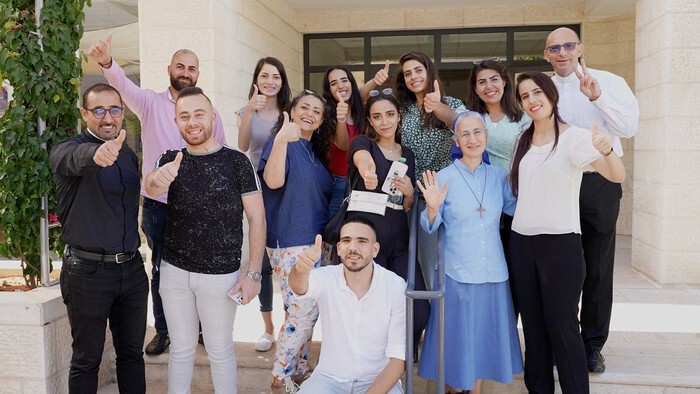Synodal process in the Middle East: Young people from Palestine want to actively shape their future
PRO ORIENTE youth workshop in Bethlehem with participants from five churches

Third Workshop in Bethlehem (2022) | PRO ORIENTE
The almost hopeless political situation, the difficult economic situation, but also worrying developments in society and within the church are particularly troubling for young Christians in Palestine. This was clearly stated by the participants of the recent PRO ORIENTE workshop in Bethlehem. Another challenge is the geographical fragmentation, which makes it very difficult to come together in Palestine due to the wall and roadblocks erected by Israel. Simple routes that would normally take around 20 minutes would take an hour and a half, not to mention the high costs involved, according to the workshop participants. The combination of all these factors is increasingly leading to the decision to leave home and emigrate, especially among young people.
The PRO ORIENTE Foundation and the ecumenical group “We choose abundant life” organize youth workshops in several countries in the Middle East, in which young people from different churches take part. The aim of the workshops is to give the participants the possibility to network and to jointly explore opportunities for increased church and civil society involvement in the countries of the Middle East. Viola Raheb is responsible for the project on behalf of the PRO ORIENTE Foundation. She was also present in Bethlehem.
The workshop was attended by 13 young people from the greater Bethlehem area (Bethlehem, Beit Sahour, Beit Jalla), Ramallah, East Jerusalem and Jenin. They belonged to five churches: the Greek Orthodox, the Syrian Orthodox, the Roman Catholic, the Melkite Greek Catholic and the Evangelical Lutheran Church. Among the speakers were Father Bashar Fawadleh, responsible for youth ministry in the Latin Patriarchate of Jerusalem, and Prof. Mitri Raheb, founder and president of Dar al-Kalima University, who is also a member of the “We choose abundant life” group. Pastor Fawadleh spoke about the challenges for young people in church and society, while Prof. Raheb dealt with the topic of future perspectives and options for action for young people in church and society. The workshop took place at Dar al-Kalima University and was made possible thanks to funding from the German Association of the Holy Land (DVHL).
The Belgian ecumenical pioneer Fr. Frans Bouwen M.Afr., who lives in Jerusalem and came for lunch on Sunday afternoon, was visibly moved by the meeting and the discussions with the young people.
With regard to church youth work and ecumenism, the young people said that there has been a significant decline in this respect in all churches, especially since the outbreak of the pandemic. They also mentioned that many church youth programs were designed more as leisure or cultural activities, the theological dimension was neglected, and ecumenism was hardly ever mentioned. On the contrary, an anti-ecumenical attitude could be observed among some clergy, participants said.
Viola Raheb is concerned about the young people's findings: “As a Christian from Palestine who became an advocate for more ecumenism and unity in diversity through church and ecumenical youth work in Palestine, I am saddened to see that the young Christian generations in Palestine now lack this experience. This makes it all the more urgent to create spaces of ecumenical dialogue and encounter for them.” Incidentally, the experiences of young people in Palestine would coincide with those in other Middle Eastern countries.
Another similar, but now positive experience: “The young people are surprised that someone wants to listen to them and offers them an opportunity to express themselves and think creatively about the future of our churches and how more participation of young people is possible,” said Raheb. It was striking that none of the participants had ever heard of the Catholic Church's synodal process or the topic of synodality.
The interest and willingness to get to know each other better and to work together for the continuation of a vibrant Christianity in Palestine was so great that the young people agreed to a six-month training program, which has already begun (online).
Raheb concludes: “There is a longing for and a desire for more ecumenism among young people, and they are willing to get involved and committed. That is a reason for hope.”
The next PRO ORIENTE youth workshops will take place in Iraq (beginning of July) and the Holy Land (end of July). Egypt is on the agenda for mid-September. A workshop is also planned for Syria, although the date has not yet been set. The first workshop took place in Beirut (Lebanon) in March, followed by a second one in Amman (Jordan) in May.



